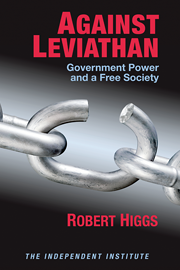Many of the costs will be hidden from us. War always tends to increase government power, historian Robert Higgs has noted. The Kosovo war may be no different.
In a recent article in the Freeman, Higgs shows how war has helped fuel the rise of big government.
"In 1914, federal spending totaled less than 2% of gross national product," he wrote.
The top income tax rate was 7%, levied on incomes over $500,000. And 99% of Americans paid no income tax.
Federal workers made up less than 1% of the total work force. And most federal employees worked for the Post Office. There was some federal regulation: anti-trust laws and oversight of railroads. But federal rules were few.
When President Wilson took the U.S. into World War I, things changed.
The government virtually nationalized key industries: shipping, telegraphs, telephones and railroads.
It got involved in labor relations, securities sales and agriculture. It started regulation coal and oil sales. It built the armed forces up to 4 million men, 10% of the work force.
The newly created Federal Reserve started printing money to pay for the war.
Clearly, these changes didn’t sit well with many folks. So the government sent to prison anyone critical of the war, the draft or its other actions.
Many of these laws and rules ended after the war. But not all. The government never again shrank to its pre-war size, Higgs noted.
"Some emergency powers migrated into regular government departments such as State, Labor and Treasury and continued in force," he wrote.
The government kept its role in shipping and railroads. Wartime bans on alcohol helped lead to Prohibition.
When World War II started, the federal government was much larger than it had been on the eve of the last war.
"Federal spending now equaled 10% of GNP," Higgs noted.
The feds employed 2.2% of the work force in regular civilian and military jobs. And it had another 5.9% in make-work programs.
During WWII, the federal government grew greatly. It raised the top income tax rate to 94% from 23%. And it withheld money from workers’ paychecks to make sure people paid those higher taxes.
It enacted a host of economic rules. It nationalized many plants, and even some industries, such as coal.
At the end of the war, most of these rules faded. But again, not all.
And federal taxes remained four times higher than they were before the war, Higgs wrote.
In 1946, Congress passed the Employment Act. This law dedicated the government for the first time to maintaining full employment.
World War II gave way to the Cold War. This brought new spying on Americans, both at home and abroad. The Cold War brought back the draft. And it led to new federal spending.
Again, even though the Cold War is over, many of these programs remain, Higgs noted.
It’s clear that wars can be used to expand government even if there’s no real fighting.
Politicians have learned how war can be used to justify new taxes and rules. And when there’s no external enemy, they’ve found internal foes.
The feds have fought wars on poverty, inflation and drugs, among other. All of these "wars" have been used to justify new taxes and red tape.
For instance, to fight the war on drugs, Congress passed a number of "money laundering" laws. These require banks to report on many financial transactions involving cash.
War may sometimes be necessary, but it has a cost. And sometimes that cost is freedom—even for the winner, Higgs noted.



















